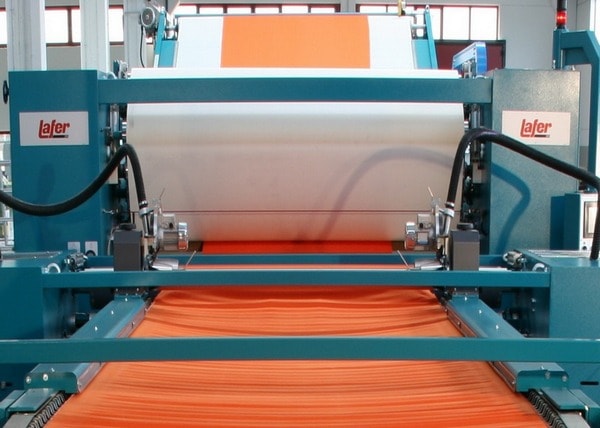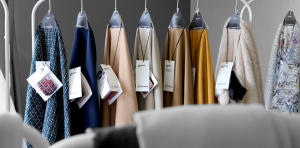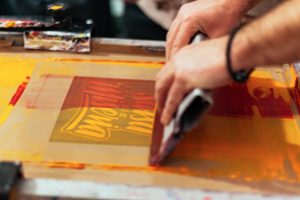Choosing your wholesale garment manufacturer is one of the most important decisions to make in starting a clothing brand. The quality, sustainability, and ethics behind every piece you produce go right back to the manufacturer that has your work. Here are some essential aspects to consider:
Location: Where your manufacturer is located can affect shipping times, costs, and environmental sustainability. If you are in the USA and looking for a garment company near me, the best choice, AVmade, is for you; turnaround times are faster, and it helps out the local economy.
Sustainability and Ethics: It is essential to find a manufacturing partner who shares your values about sustainable practices and ethical production. Search for manufacturers who emphasize eco-friendly policies in order to establish healthy models within the industry.
Quality of Materials and Craftsmanship: Therefore, no sacrifice on quality is possible if the customers are to be satisfied and returns low. Pick a manufacturer with excellent materials and refined quality to produce long-lived products.
Communication and Transparency: Good communication between both parties is essential for a good partnership relationship with the top garment manufacturers. They should regularly publicize progress in production and be open about their processes.
Customization Options: Stand out from the crowd by going with one of the leading wholesale garment manufacturers, such as AVmade, who offers many customization choices so you can create a product design matching whatever your market needs.
Pricing and Minimum Order Quantity (MOQ): Getting acquainted with manufacturing costs: In order to sell at a higher price while maintaining control over material quality and artistry standards, you should compare their prices, but they have minimum order quantities (MOQs) which may not be conducive for your scale-up plans.
In sum, choosing a garment manufacturer near me involves more than simply finding someone to make your clothes. It’s about establishing a relationship with an ally who can see and support your brand. Not taking the time to research or ask questions will ensure that you select something harmful for your business in the long term.

Questions to Ask Your Potential Garment Manufacturer
In the front lines of fashion entrepreneurship, alliances are the name of the game. One of the most important of these alliances is with your clothes manufacturer. Before finalizing your decision, it’s imperative to pose relevant inquiries in order to make an informed choice:
What level of experience do you possess within this industry? Understanding how a manufacturer works can give essential clues to the limits of their capacities. Evaluate whether they have had previous experience working with brands of your size and style of yours.
Do you engage in domestic manufacturing within the United States? By choosing to move local production, as shown by AVmade, you’ll enjoy better communication channels, faster turnaround times, and a smaller carbon footprint.
To what extent are sustainability and ethical practices integrated into your operations? As society has put increasing importance on production methods that are ethical and sustainable, understanding a manufacturer’s commitment in these areas becomes increasingly crucial.
What are the minimum order quantities (MOQs) required? The number of minimum orders required for engagement is an important consideration, as some manufacturers only make for more significant brand names. In contrast, others are more adjustable and comfortable stretching to accommodate smaller batches as well.
Can you furnish references or samples upon request? But you should never give up on getting actual samples to judge quality properly and consulting other entrepreneurs; you’ll find out whether that manufacturer’s workplace is genuinely reliable and what their competencies actually are.
How do you approach quality control procedures? Because such stringent standards targeted directly at maintaining exemplary product quality continue to be essential, it is necessary to ensure that such rigorous standards permeate all steps of garment making and not commit further investment before being confident of this.
What are typical lead times associated with delivery alongside shipping costs involved? Such a trend thus illustrates why thorough knowledge pertaining equally to the timeframes and costs involved represents intelligent behavior: It helps greatly in both budgeting and pricing efforts. Understanding just how punctual they must be can be a considerable business advantage.
Do you extend customization options to clients? When your brand emphasizes individuality in design, understanding the level of customization a potential garment factory can accommodate becomes increasingly essential. Only this way can you ensure that their capabilities and your vision are in sync.
For an entrepreneur, choosing a garment manufacturer becomes extremely important in terms of how successful one’s brand will be. Through this kind of questioning, entrepreneurs can find partners who share their values and can help them build their brands into something genuinely world-class.
Steps Involved in Working With a Garment Manufacturer
Starting a clothing line is an exciting but daunting undertaking. Finding the proper garment manufacturer is the key to a smooth and successful venture. Below, we present you with a comprehensive step-by-step guide on how to navigate this crucial partnership:
1. Conduct Thorough Research: First, do thorough homework on different manufacturers whose ethos is similar to your brand. The U.S., then, should put a higher premium on companies like AVmade that stress sustainable, ethical production in this country.
2. Initiate Clear Communication: In as concise a brief as possible, send the following information to potential manufacturers describing your design concept, the quantity you want, the material you prefer, and whether there are any special requirements, such as any additional customization.
3. Arrange Facility Visits: When possible, arrange visits to production facilities to observe their manufacturing processes, and examine their strengths and weaknesses, and determine whether ethical standards are being followed.
4. Request Sample Products: Equally important, of course, is first to obtain samples of your designs from prospective manufacturers so you can judge for yourself the quality of their craftsmanship before making any agreements or commitments with them.
5. Finalize Terms and Contracts: This is because the terms that are most important for both parties’ expectations are pricing structures, minimum order quantity (MOQ) numbers, and lead times for deliveries. These and other relevant terms must be discussed in great detail, and without a contractual basis, even a spoken agreement will not be valid.
6. Commence Production Phase: When all the aspects have been agreed upon, the chosen manufacturer will launch the production process. Preserving channels of communication at this stage allows for rapid adaptation or adjustment if needed.
7. Enforce Stringent Quality Control Measures: Enforce Stringent Quality Control Measures: Select a competent manufacturer like AVmade, and be sure that strict quality control procedures are carried out. For every single garment produced, it guarantees that all are made to the high standards defined by your brand.
8. Delivery & Fulfillment Procedures: On manufacture, your garments will be packed and sent directly to the named destination. You are advised to get a grip on shipping costs and estimated timelines for your planning purposes.
9. Provide Feedback & Foster Future Collaborations: Once the manufacturer has delivered the finished products, provide some constructive criticism. This cycle of continuous feedback not only helps you to improve subsequent production batches but also deepens your relationship.
10. Repeat Orders & Scale Accordingly: To increase brand with manufacturing quantities. So ensure that your chosen manufacturer is able to keep up with such growth demands.

Setting Up a Long-term Relationship With a Garment Manufacturer
A vibrant clothing brand isn’t all about clever designs. It’s also about developing relationships–especially the one with your garment factory. A strong alliance means consistency, quality, and expansion. Here are some strategies to foster this bond effectively:
Effective Communication: Start by expressing your expectations and requirements clearly. Updates, discussions, and feedback sessions make sure both sides stay in tune.
Transparency as a Foundation: Regarding the plans, difficulties, and objectives of your brand, be open. An atmosphere of openness allows your manufacturer to predict your changing needs and keep up with you.
Punctual Payments: Pay faithfully according to the terms agreed upon; punctual remittance inspires trust while expressing appreciation for their services.
Continuous Feedback Loop: After each production cycle, give the feedback needed to amend the manufacturing process further, as well as boost the quality of the product.
Collaborative Innovation Endeavors: Indeed, many quality manufacturers–such as AVmade often integrate newly discovered technologies or environmental preservation into play. Aim high. See if you can team up in these areas to bring your brand to the front lines of progress.
Value Loyalty Above All Else: Monitoring market trends is necessary, but sacrificing the fruitful relationship for that much cost-cutting can put long-term benefits at risk. It is better to be loyal to those who can bear the burden than to chase gains endlessly.
Joint Celebration of Triumphs: When your brand reaches milestones, it is always best to celebrate those accomplishments together with your manufacturer. That environment of shared accomplishments ensures a profound partnership.
Developing invariable top garment manufacturers in fashion’s harsh environment is the strategic advantage so that a long-term prosperous based on trust, mutual respect, and transparent communications may be realized.
Customization Options Offered by Leading Garment Manufacturers
In the current environment of the fashion world, more than offering a high-quality product is required. The best way to stand out is to be original and yourself. Many discerning garment manufacturers or domestic manufacturers now offer customers every possible customization option, enabling the brand to set itself apart more effectively. Here’s what you can anticipate from these offerings:
1. Diverse Fabric Selection: Indeed, the choice of fabric is an integral part of turning out a desirable and environmentally friendly clothing line. Driving availability of sustainable material: The leading manufacturers offer an even more comprehensive selection of premium sustainable fabrics to single brands, enabling them to make their choices in concert with their values.
2. Prints and Embroidery: When you combine intricate embroidery or bright prints into designs, the mundane becomes treasured work that can make an impression.
3. Labels and Branding: The use of custom labels and tags allows an added layer of personal touch to each object and, at the same time, builds brand recognition and consistency from collection to collection.
4. Distinctive Cuts and Styles: Stepping outside of ordinary design thinking gives brands the opportunity to become trendsetters in their industry. Manufacturers like AVmade involve brands throughout the development process, which offers distinct silhouettes that complement rather than dominate each brand’s unique design philosophy.
5. Sustainable Alternatives: However, in recent years, along with environmental consciousness increasing in fashion circles, the major manufacturers began to offer natural dyeing techniques, organic materials with Sweatshop-free certificates, and a selection of processes with smaller ecological footprints.
6. Customized Packaging Experience: Seeing how much unboxing matters to consumers today, proper packaging combined with eco-friendly wrapping materials and even personalized notes can significantly enhance customer satisfaction.
7. Adaptable Production Runs: Whether launching new designs or limited-edition collections, whoever can be flexible with production quantities is a godsend for designers. That is why these producers create such valuable designers.
8. Integrating of Technological Advancements: From bright fabrics to technological integration, change is the future of fashion. Leading manufacturers actively occupy the forefront of these developments. This allows for each brand to be a pioneer within its niche.
Customization goes beyond mere design changes; it means that each one of your pieces wears your brand with pride. Working with manufacturers who understand this philosophy, such as AVmade, means that every piece incorporates impressively with the values and vision of your brand.
Why Agility is Crucial in Choosing a Garment Manufacturer
With trends changing rapidly and consumer demands constantly in flux, the fashion industry is in constant flux. However, in such a volatile environment, the preparedness to adapt quickly in manufacturing becomes essential. Here’s why:
Keeping up with Trends: The pace of fashion is swift. A go-with-the-flow clothier can keep his step by quickly falling into step with fresh trends and satisfying market preferences.
Meeting Seasonal Demands: Fashion cycles can very much depend on the seasons. Swift, as a fox manufacturer, can easily hike production in peak seasons and use resources economically in off-peak times.
Embracing Sustainability: However, as sustainability picks up steam, manufacturers must be flexible in making use of environmentally friendly materials and processes consistent with today’s tastes. Firms like AVmade actively incorporate sustainable measures into their operations.
Catering to Customization Needs: Today’s consumers want distinctive products customized to their wishes. The advantages of agility for manufacturers are that they can quickly provide customization options such as design variations or personalized prints.
Overcoming Production Challenges: During the production process, unexpected obstacles can arise. However, an agile manufacturer can swiftly change course and still meet delivery dates with solid solutions.
Efficient Inventory Management: To reduce waste from overproduction or lost sales from underproduction, balancing inventory levels is critical. A Supple clothing manufacturer correctly anticipates demand patterns and stocks accordingly.
Integration of Technology: Fashion’s future, to a large extent, is riding on the outcome of technology integration. As for wearable tech, or designs developed by artificial intelligence, agile manufacturers are very receptive to these innovations.
Building Stronger Partnerships: There is more to agility than being operationally flexible. Communication skills and understanding of brand requirements are also necessary. AVmade, an agile garment manufacturer, cultivates interactive relations with brands. Each party can learn from the other by joint effort.
In short, in a fast-changing world, agility is no trivial matter in the world of fashion. If a brand is looking to make a difference, this is the quality it needs to look for in a garment manufacturer.
What Makes a Garment Manufacturer the Best?
Choosing a garment manufacturer is an essential decision for any fashion brand. But with so much to choose from, how do we spot the difference between the best manufacturers and their rivals? Here are some key factors that define top-tier garment manufacturers:
1. Emphasis on Quality Assurance: Renowned manufacturers put quality above all else. They go through a thorough testing and strict quality control process to make sure that every item is of the best possible rate.
2. Ethical and Sustainable Practices: In the environmentally aware world today, leading suppliers such as AVmade show a strong sense of social responsibility and environmentally friendly production methods. By aligning themselves with the global focus on environmental sustainability, they help to shrink the industry’s ecological footprint.
3. Versatility in Services Offered: Experienced garment manufacturers provide an array of well-equipped services to deal with varying brand needs.This consists in providing different kinds of fabrics and different styles of stitching, suitable to individual tastes.
4. Transparent Communication Channels: The top manufacturers value continuous communication throughout the production process. When brands raise any concerns, they respond promptly and frequently provide progress updates. They also actively seek customer feedback and build trusting relationships.
5. Pioneering Techniques: The spirit of fashion lies in newness, in constantly differentiating one’s product and R & Ding the methodology, equipment, and technologies one employs and continually developing and improving on them, in order to provide brands the latest know-how in garment making. This puts fashion labels in step or even ahead of today’s fashion trends in the field.
6. Timely Deliveries: This requires highly reliable suppliers. In this way, for the sake of being able to keep stable market schedules, the most dependable firms are able to draw up accurate plans and execute them quickly. Their efforts in promptness make them recognized as reliable links in the supply chain network.
7. Competitive Pricing Structure: First-rate manufacturers still must stress product quality. Of course, cost-effectiveness is an important consideration for brands. A desire for both affordability and uncompromising quality, coupled with a willingness to modify competitive pricing to accommodate the financial conditions of their clients.
8. Customization Capabilities: Customization is one among several factors that allow brand owners to differentiate themselves from the competition. Manufacturers with rich customization capabilities–in terms of design, branding, and so forth– provide brand-specific, one-off solutions tailored to each brand.
9. Advantages of Domestic Production: American-based manufacturers, in particular, have several advantages. Secondly, closeness helps communication with customers. Second, the shorter shipping distances allow for faster turnaround times. Furthermore, manufacturers at home are in line with local quality standards so that product quality can be guaranteed.
10. Adaptability: The fashion industry is out in a world where trends change at the speed of light and where market demand changes with the times. Top-notch garment manufacturers show an incredible degree of adaptability to such an environment. They are fast to change pace with the times and can make rapid adjustments to the production strategy based on changing brand needs.
In the end, if you are looking for the best garment manufacturers near you, AVs are not just providers of a service; they become partners on the road toward the cultivation of fashion brands. By helping these enterprises realize the value creation through their steady devotion to it, prudent guidance, and concurrence with the direction of a brand’s development and ideals, they make an essential contribution to their success.
How to Choose the Right Garment Manufacturer for Your Brand
Picking the proper clothing manufacturer is one of the critical aspects that can take your clothing brand to new heights or pants, as the case may be. Collaboration is of paramount importance. You need to find a partner who can share the vision, values, and growth objectives set out by your brand. Here is an ultimate guide to help you navigate this critical decision:
Clearly Define Your Requirements: Become familiar with what you want for your garment-whether it be environmentally friendly materials, unique customization, or fast turnaround. This clearness will make the selection easier.
Conduct Thorough Research and Seek Recommendations: First, check out some online resources, attend trade shows related to your sector, and actively seek advice from people with more experience than yourself.
Assess Their Expertise in Your Niche: We all know that not all manufacturers are equally capable. Some specialize in producing sportswear. Others, such as our great company “AVmade,” make clothing products that are not only ethically produced but environmentally friendly as well.
Visit Their Manufacturing Facility if Feasible: If available, make a personal visit to their facility as this offers tremendous insight into how they run their business, what kinds of machines they use, and what sort of strict quality standards and ethical principles they are adhering to.
Request Product Samples for Evaluation: Analyzing the product samples that hopeful business partners bring to your scrutiny. From this, you can ascertain their level of craftsmanship, what materials they work with, and the thought that goes into even small details.
Evaluate Communication Efficiency: The effective exchange of information goes hand-in-glove when working with any manufacturer; make sure these channels are responsive, reflecting an intelligent understanding of your unique needs and a spirit of willingness to accept constructive feedback.
Consider Geographical Proximity: Nationally based companies such as “AVmade” found in the USA provide many advantages, for instance, vastly reduced shipping times that result in more rapid turnaround periods, coupled with the convenience of more accessible communication since it takes place within the same time zone, so it is possible to keep up with local laws governing garment production.
Thoroughly Review Pricing Structure: Cost should never be the only consideration, but it must be verified that their pricing structure is in tune with your budgetary concerns without damaging product quality.
Scrutinize Their Track Record: Analyze carefully reviews, testimonials, and case studies for potential manufacturers, which can give you some insight into their reliability coefficient, how professional the service standards are, and how high the quality level was in terms of previous cooperating companies.
Evaluate Scalability Potential: As your clothing brand crosses national borders, it needs a factory partner that can grow with the times and whose ability to scale up smoothly is matched by its capability of flexibly adjusting to different needs during various phases of growth.
Negotiate Contractual Terms Clearly: After you have judiciously thought and decided upon the types of manufacturers you require for your brand, enter deeply into discussions surrounding all the possibilities for your two sides to benefit one another, including production timetables with proper consideration given to the payment structures as well as accessible and transparent delivery methods, all to avoid the possibility of misunderstanding or future conflicts.
Thus, the choice of the best wholesale garment manufacturers is a strategic one crucial to long-term prospects in the industry. Prudently adhering to these rules and through cooperation with learned counterparts such as “AVmade,” you lay firm foundations underpinning robust business relationships and ultimately crown yourself with the mantle title of Conqueror in this hyper-competitive environment.
Quality Control in Garment Manufacturing: Best Practices
To gain a brand name and make it, one must be second to none in every piece of clothing. Therefore, quality control is an essential aspect in the field of top garment manufacturers. Let us delve into some of the most effective strategies to uphold these standards:
1. Establishing Clear Guidelines: When coming out of the gate, it is essential to establish precise quality target indicators and reference points. This is a point of reference when assessing the end products.
2. Regular Inspections: Checking at various stages of the manufacturing process is worth more than waiting until the end. Identifying problems early on saves both time and money.
3. Employing Seasoned Professionals: This alone requires the appointment of veteran teams in quality control and thorough evaluative skills.
4. Utilizing Cutting-Edge Equipment: When the garment quality must be objectively assessed, it is simply necessary to use state-of-the-art tools, including fabric inspection machines, color matching systems, and tension testers.
5. Continuous Training Programs & Workshops: Training sessions provide staff with opportunities to keep up with the changing standards of the industry and the new developments in technology and inspection methods.
6. Facilitating Feedback Channels: Developing practical and direct communication links between quality check personnel and production teams promotes continuous improvement on all fronts.
7. Random Sampling Techniques: In addition to routine inspections, adopting random sampling procedures provides an objective assessment of the quality of products.
8. Comprehensive Documentation Practices: In order to determine recurring problems and find practical solutions, they should keep meticulous records of each stage of the quality control cycle.
9. Laboratory Testing Protocols: There are also strict laboratory tests concerning elements like colorfastness, resistance to tearing, and shrinkage. The results are highly accurate, allowing manufacturers to make sure that garments conform precisely to pre-specified standards.
10. Supplier Audits: If procurement involves buying material externally, however, it becomes necessary to frequently sample suppliers to ensure their products conform to the rigid quality standards of the brand.
11. Consumer Feedback: Finally, the honest judges of a garment factory are the people who wear it. For example, asking for and analyzing feedback from users at the end of the cycle provides precious information about real-world performance, highlighting areas that can be improved.
Using these best practices in the garment factory process allows brands to deliver unchanging quality, as well as perfection in every piece. Working with manufacturers like AVmade only emphasizes a determination to maintain standards throughout the production process.
Comparing Domestic vs. Overseas Garment Manufacturers
Whether to go with a domestic or an overseas garment manufacturer is an essential choice for brands in particular. Each option has its advantages and drawbacks and requires a lot of thinking. To help guide your decision-making process, we have compiled a comprehensive comparison:
1. Lead Times:
Domestic: Efficient turnaround times are the trademark of manufacturers such as AVmade.
Overseas: However, when working with an overseas manufacturer, the shipping time and customs clearance time tend to elongate.
2. Cost:
Domestic: Because local labor and material rates are higher, partnering with a domestic manufacturer may be more costly than overseas options. But these costs can be offset by lower shipping costs and no import duties.
Overseas: In fact, although labor costs tend to be less than those at home when working with an overseas manufacturer, shipping fees, customs duties, and perhaps even unexpected charges need to be taken into account.
3. Quality Control:
Domestic: Working domestically makes it easier to perform regular quality checks because communication channels are more accessible. This ensures uniform product quality in the course of manufacturing.
Overseas: When manufacturers are located abroad, control over product quality becomes logistically challenging as quality standards may vary by region.
4. Communication:
Domestic: When working with domestic manufacturers, there are no language problems, and time differences are not so significant, so communication is much more fluid.
Overseas: If handled skillfully, overcoming language barriers and differences in time zones would not be particularly difficult.
5. Minimum Order Quantities (MOQ):
Domestic: Starting domestically provides greater flexibility about MOQs, making it ideal for startups or limited editions, where smaller numbers are needed.
Overseas: However, with an offshore supplier, MOQs are often higher, and this can be a more significant obstacle to smaller brands.
6. Sustainability & Ethics:
Domestic: Working with domestic manufacturers, it is easier to verify sustainable and ethical practices. There are indeed brands like AVmade that stress sustainability and responsible production in America.
Overseas: Getting overseas manufacturers to adhere to ethical labor standards and sustainable production practices takes more effort.
7. Customs & Duties:
Domestic: Domestic partnerships cut customs or import duties right out of the equation, greatly simplifying logistics.
Overseas: In addition to import duties, potential customs clearance delays can affect both costs and lead times significantly.
8. Consumer Perception:
Domestic: The words “Made in the USA” have their attraction. Many consumers like to see them on a product as an added encouragement to buy.
Overseas: People in different regions likely have different perceptions of quality and ethics, which in turn affect consumer perception of products
9. Scalability:
Partnering with domestic manufacturers means that domestic scaling operations become much more accessible, and adjustments can be made quickly in response to changing needs.
Heading offshore Scalability may involve renegotiations and more extended adjustment periods.
Finally, picking between domestic and overseas garment manufacturers all comes down to what your brand determines is essential, what your budget allows, and your long-term prospects. Either way, both have their advantages. The guarantee with reputable domestic manufacturers like AVmade of high-quality goods made ethically in a fashion environment that is leaner and nimbler than ever before.






